CNLM Graduate Students Launch International #BlackInNeuroWeek – Begins July 27
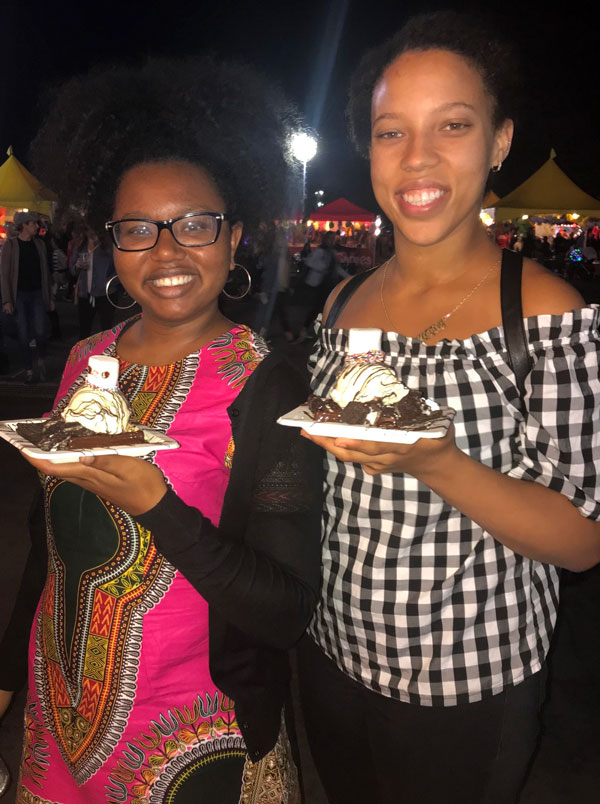
Graduate students Angeline Dukes and Elena Dominguez pose together at a CNLM event.
When graduate students Angeline Dukes and Elena Dominguez started their doctoral careers, they found themselves as the only two Black people in their department. Coming to UCI, they knew they would face challenges of representation but underestimated how isolated they would feel. “I'm so grateful that we had each other, but other Black students beginning their programs aren't so lucky,” said Angeline Dukes, a neuroscience PhD student in the Fowler Lab. “I realized how essential it is for all of us to develop connections with other Black neuroscientists globally and have an opportunity to highlight our perspectives as well as our scientific contributions; thus #BlackInNeuroWeek was born.”
#BlackInNeuroWeek is a virtual opportunity for aspiring and established Black neuroscientists from across the globe to connect, learn, and inspire one another. The Center for the Neurobiology of Learning of Memory is one of the sponsors for this event and serves as the administrative home for the initiative. We are fortunate to house two of the founders, Angeline Dukes and Elena Dominguez. “#BlackinNeuro is a powerful grassroots movement celebrating Black Excellence in the brain sciences,”said Michael Yassa, Director of the Center for the Neurobiology of Learning and Memory. “The impact of such an effort cannot be overstated and we are delighted to support it.”
#BlackInNeuroWeek begins July 27, 2020 and includes multiple panels and events to engage everyone from high school students to graduate students to career professionals.
View Event Line Up
RSVP to Attend
#BlackInNeuro Social Media
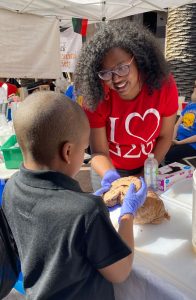
Graduate student Angeline Dukes shows a young brain explorer different parts of the brain.
Q&A with Angeline Dukes
We sat down with Angeline Dukes to find out more about the movement and the upcoming events.
How did the idea for #BlackInNeuroWeek come about?
The idea for #BlackInNeuroWeek came from all of the other wonderful weeks being organized by Black people in various fields. It was inspiring seeing so many Black people engrossed in nature during #BlackBirdersWeek, learning about our contributions in astronomy during #BlackInAstro week, and witnessing our love for plants during #BlackBotanistsWeek. All of these weeks allowed the Black people in those fields to connect and share their research broadly while also illustrating their passion and joy for science. I realized how essential it is for all of us to develop connections with other Black neuroscientists globally and have an opportunity to highlight our perspectives as well as our scientific contributions; thus #BlackInNeuroWeek was born.
How did the organizing committee come together?
The organizing committee came together through the magic of Science Twitter. On July 3rd, I sent out a short tweet "Sooo when are we doing a #BlackInNeuro week?". I honestly didn't expect to get much of a response, but within hours I had hundreds of likes and retweets. Quite a few people commented to volunteer to help organize it! I DM'ed everyone who was interested and we made a slack channel. Two days later, we had our first general meeting and drafted the events for the week. The next day, we secured the Twitter and Instagram handles @BlackInNeuro, made a website, and began securing funding. The rest is history.
#BlackInNeuroWeek was just an idea. But the collective expertise and willingness of the organizing committee to commit time, energy, and resources is what made it a reality. What I love most about planning this week is the drive and enthusiasm every single person on the committee has for celebrating Black people in this field. Truly, without them, the week could not be done.
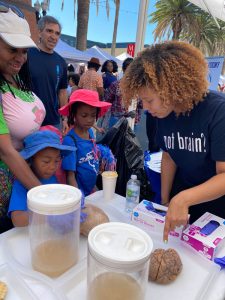
Elena Dominguez talks to parents and children about the brain at a CNLM event.
What do you hope to accomplish through the week?
This initiative is important because I know the necessity of community - having the support and guidance of people who look like you and have been through similar struggles. I am a proud graduate from Fisk University, a Historically Black College/University (HBCU). There, I was immersed in Black excellence - educated, motivated, confident Black men and women striving for greatness. But while trying to reach their own goals, they took the time to reach back and help others. Fisk is where I first saw - not just met, but physically saw for the first time in my life - Black female scientists. Growing up, I thought all scientists were old, white men because that's what we see in the media. It is difficult to strive to be what you have never seen. Seeing and being mentored by these brilliant Black women inspired me to apply to graduate school. To this day, they are still a valuable part of my community and reassure me regularly that I belong in neuroscience.
Unfortunately, not everyone has that type of mentorship as an undergraduate. While there are Black neuroscientists spread out all around the world, we are often the only one (or two) in our entire departments. The beauty of social media is that we are able to network virtually and feel less lonely by connecting with others. We have camaraderie in our shared experiences and face similar microagressions/discrimination in our professional and personal lives. While most of us are also able to connect with our lab mates and develop healthy professional relationships with our peers, it is very different being able to connect with another Black person in your field. There is a basic level of understanding, an extra tight hug of compassion when you're going through something or a simple head nod when you pass by that means 'I see you'. We know how challenging it is to be #BlackInTheIvory without having to explain it. These connections are crucial for our success and our mental health.
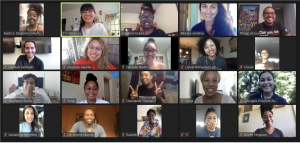
Organizers of the #BlackInNeuroWeek met virtually to plan the week.
#BlackInNeuro is a way to foster these connections, especially for younger Black students who are newer in the field. Some of us do have amazing non-Black PIs and allies who encourage us but being able to see success despite the seemingly insurmountable obstacles faced by other Black people makes it much more attainable for us.
My hope for #BlackInNeuroWeek is that Black people in neuro-related fields from all over the country and all over the world will be able to connect with each other and that our contributions will be recognized. I also hope that non-Black people will take this opportunity to connect with these phenomenal Black scientists and medical professionals, invite them for speaking engagements (preferably not just to talk about 'diversity and inclusion'), nominate them for much-deserved awards, and recognize how their own research impacts the Black community. We will be sharing many facts about Black people's willing (and unwilling) contributions in neuro, some unpleasant history, and also some fantastic ways we are revolutionizing neuroscience. Finally, I hope that our visibility goes beyond those who are already interested. I hope that some Black K-12 students and undergraduates see us doing science and are inspired by it. I hope they realize that if they want to, they can do it too, and we will be here cheering them on every step of the way.
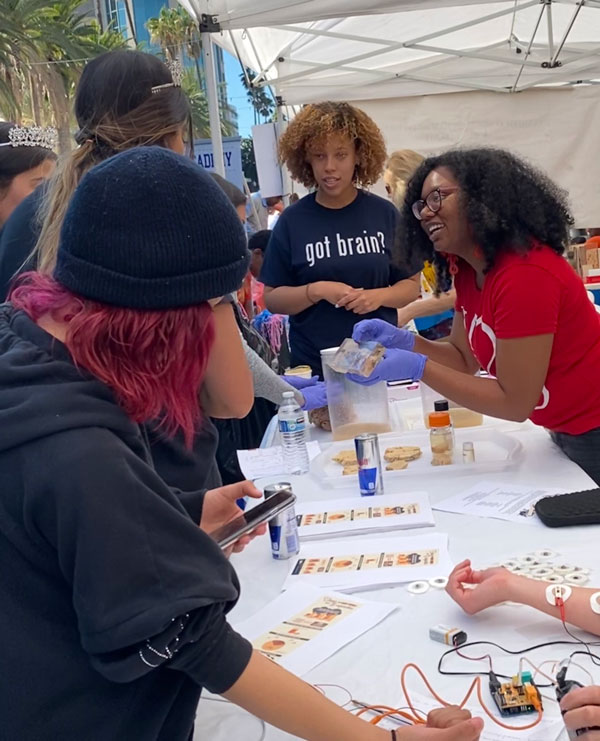
Angeline Dukes and Elena Dominguez volunteer at a CNLM event.
What has been the biggest challenge?
The biggest challenge in creating this week has been selecting what we want to focus on. There are SO many great ideas and we're constantly coming up with more. But we have to make the week engaging and be selective about the topics we want to highlight right now. The good news is that we do plan on having year-round events to address some of the topics we couldn't fit into this week.
What has been the biggest surprise?
The biggest surprise has been just the sheer amount of support - emotionally and financially. There is an outpouring of love and encouragement, not just from Black scientists, but from everyone. I think we all knew this was needed. Someone just had to kick it off.
What event/panel are you most looking forward to and why?
I am most excited for the #BlackJourneyToNeuro panels on Wednesday July 29th. When I decided I didn't want to go to medical school anymore as an undergraduate junior, I had no idea what to do next. When I eventually decided to pursue graduate school, I didn't know where to begin. When I started this PhD, I still didn't know what was expected! I'm hoping that these panels help students like me; that they clear up any confusion we have and make it clear what our options are. As a first-generation college student, it is increasingly challenging to find this guidance because people just assume since you've made it this far that you know what to do. Spoiler: we don't. I am still learning and look forward to these panels helping me too!
To learn more about #BlackinNeuro, to participate or contribute to the movement, visit blackinneuro.com
